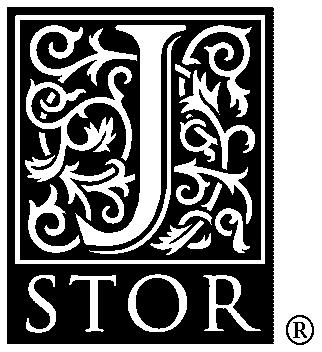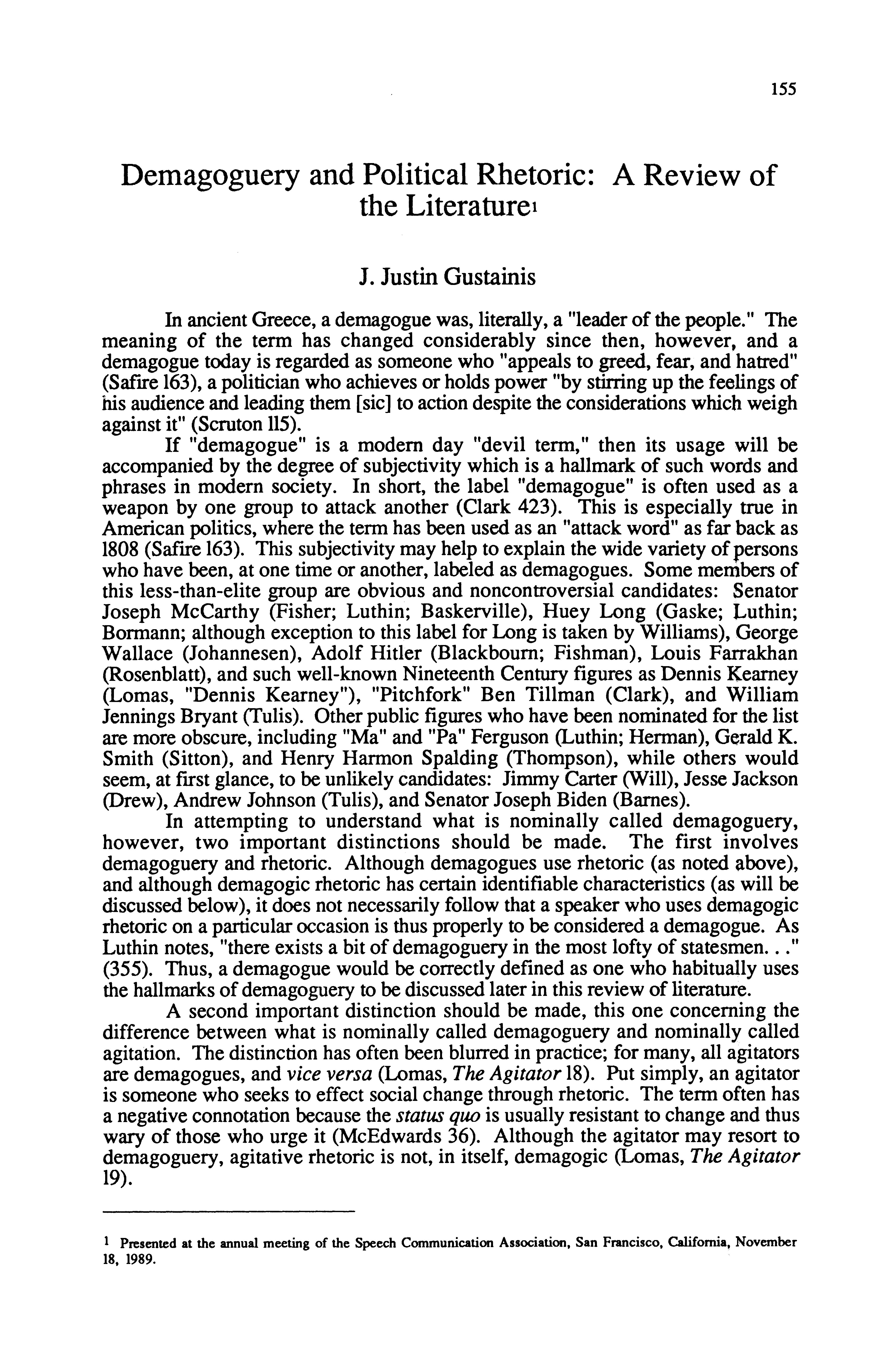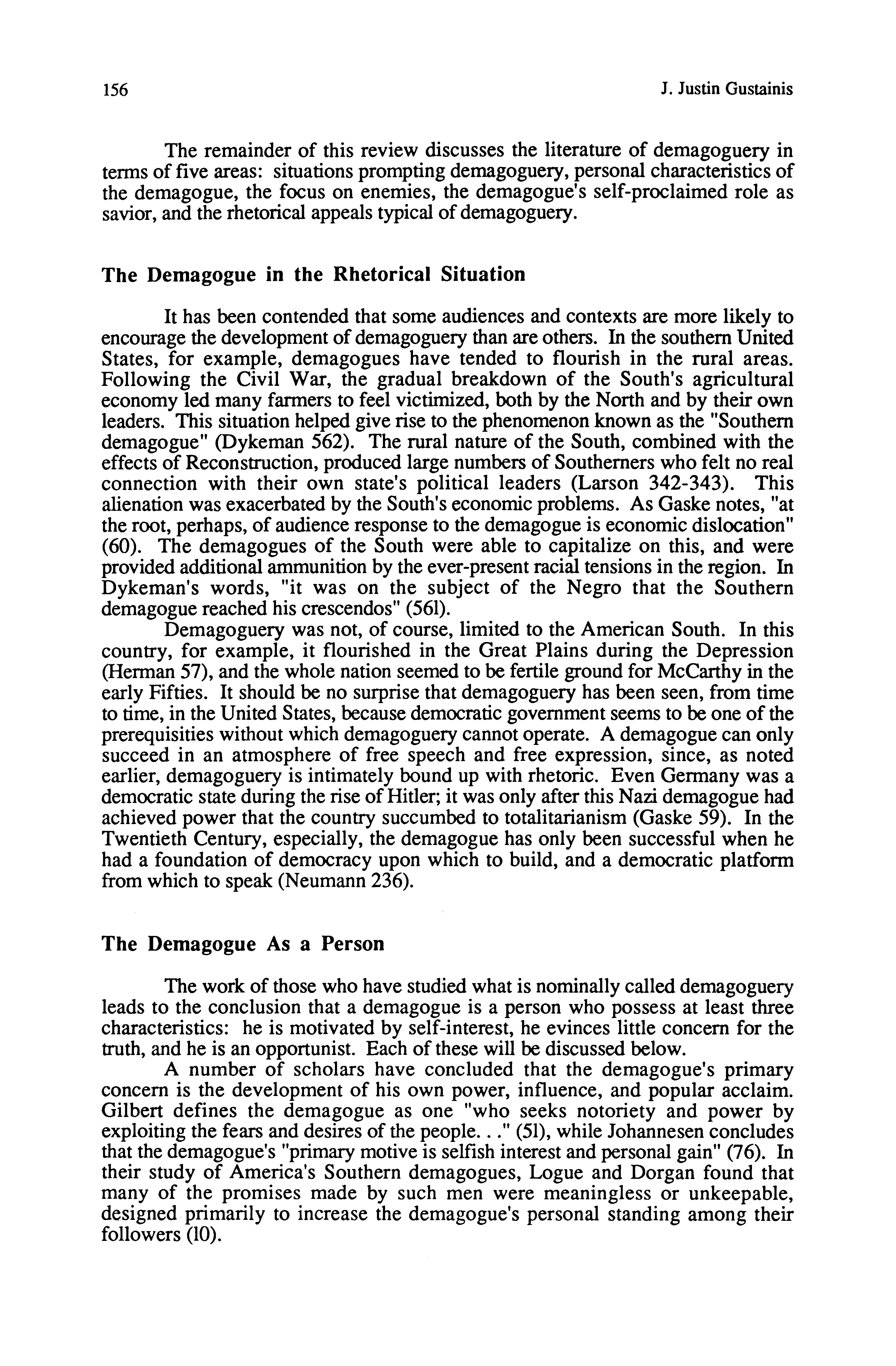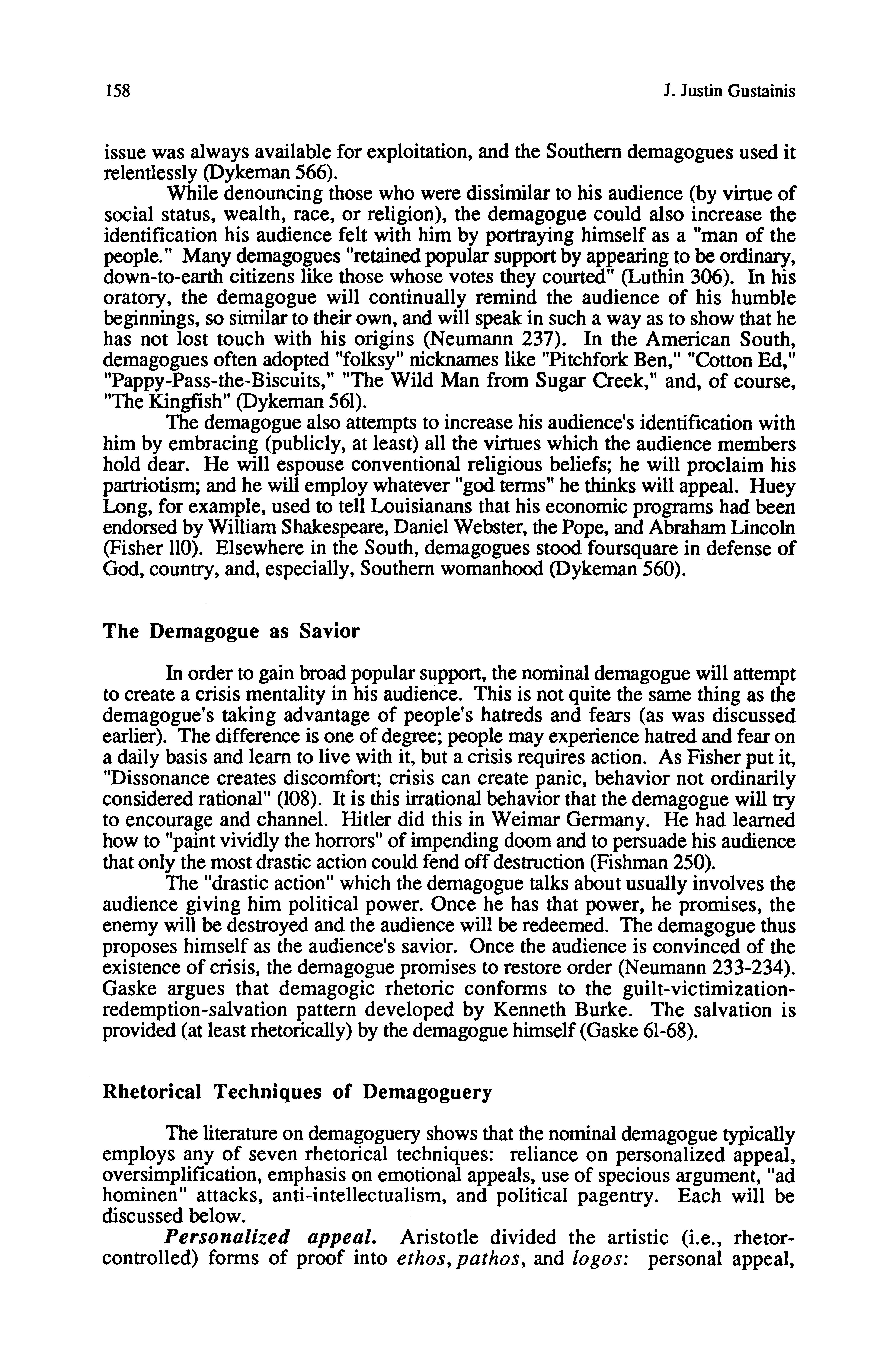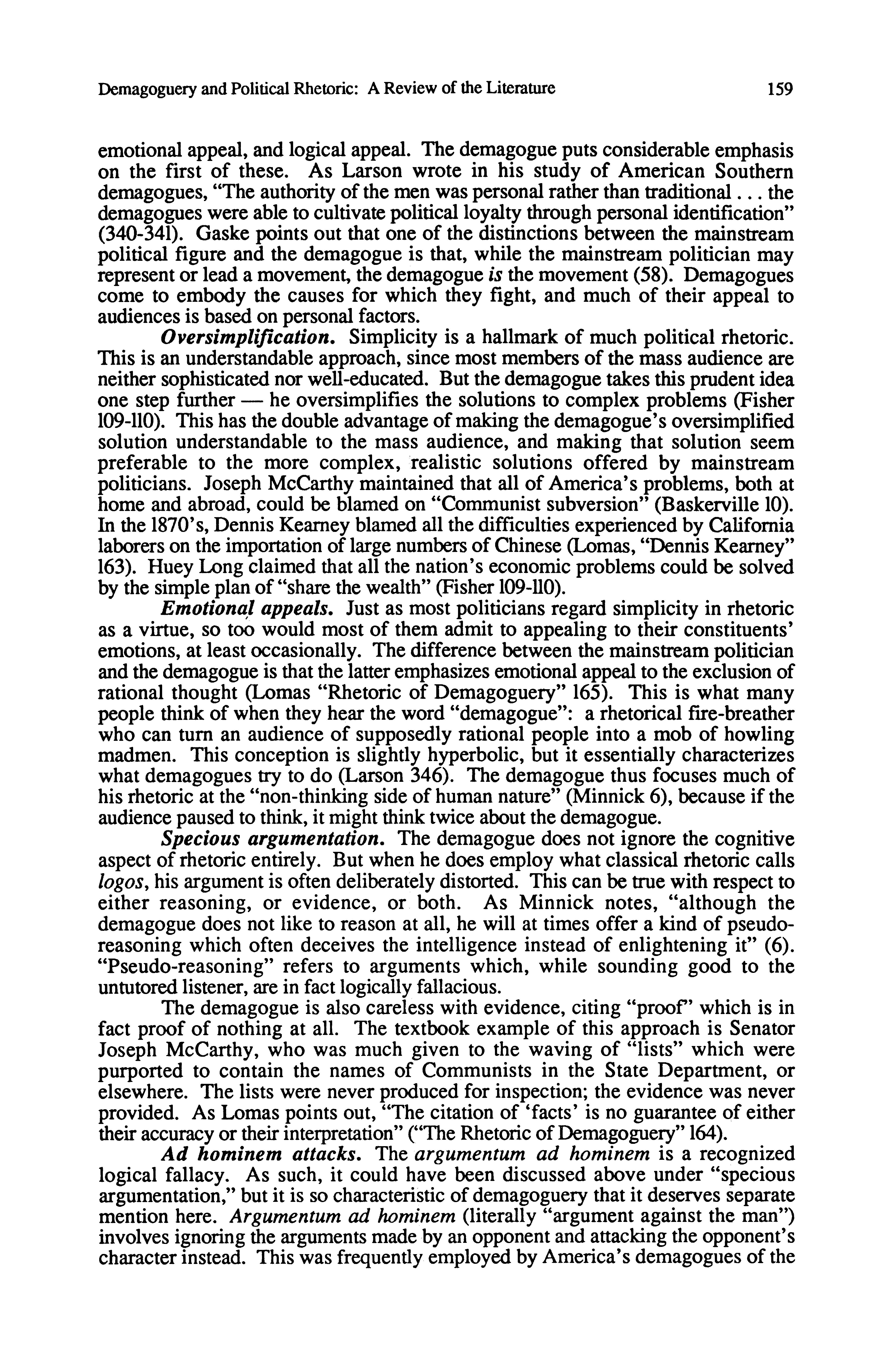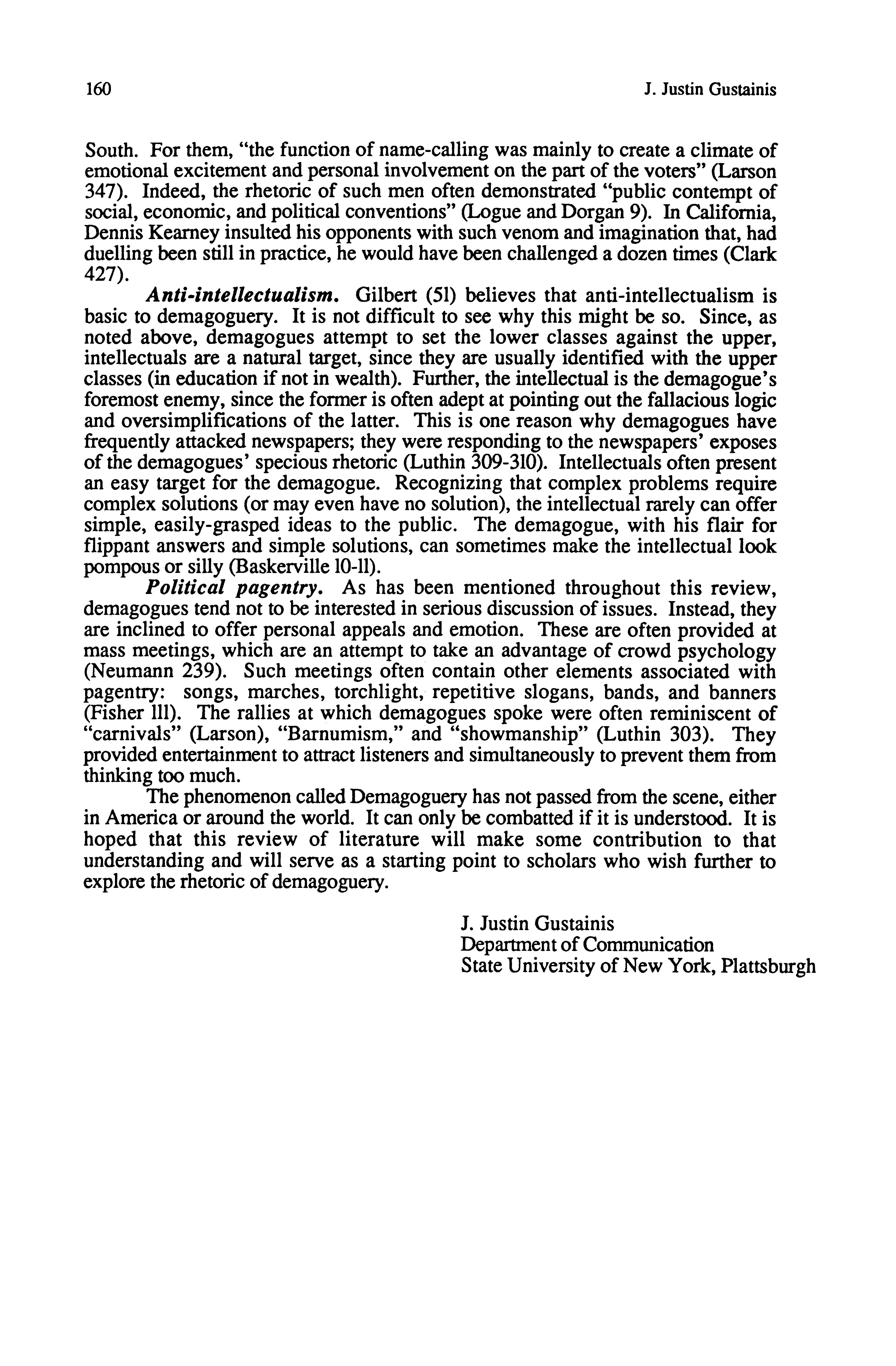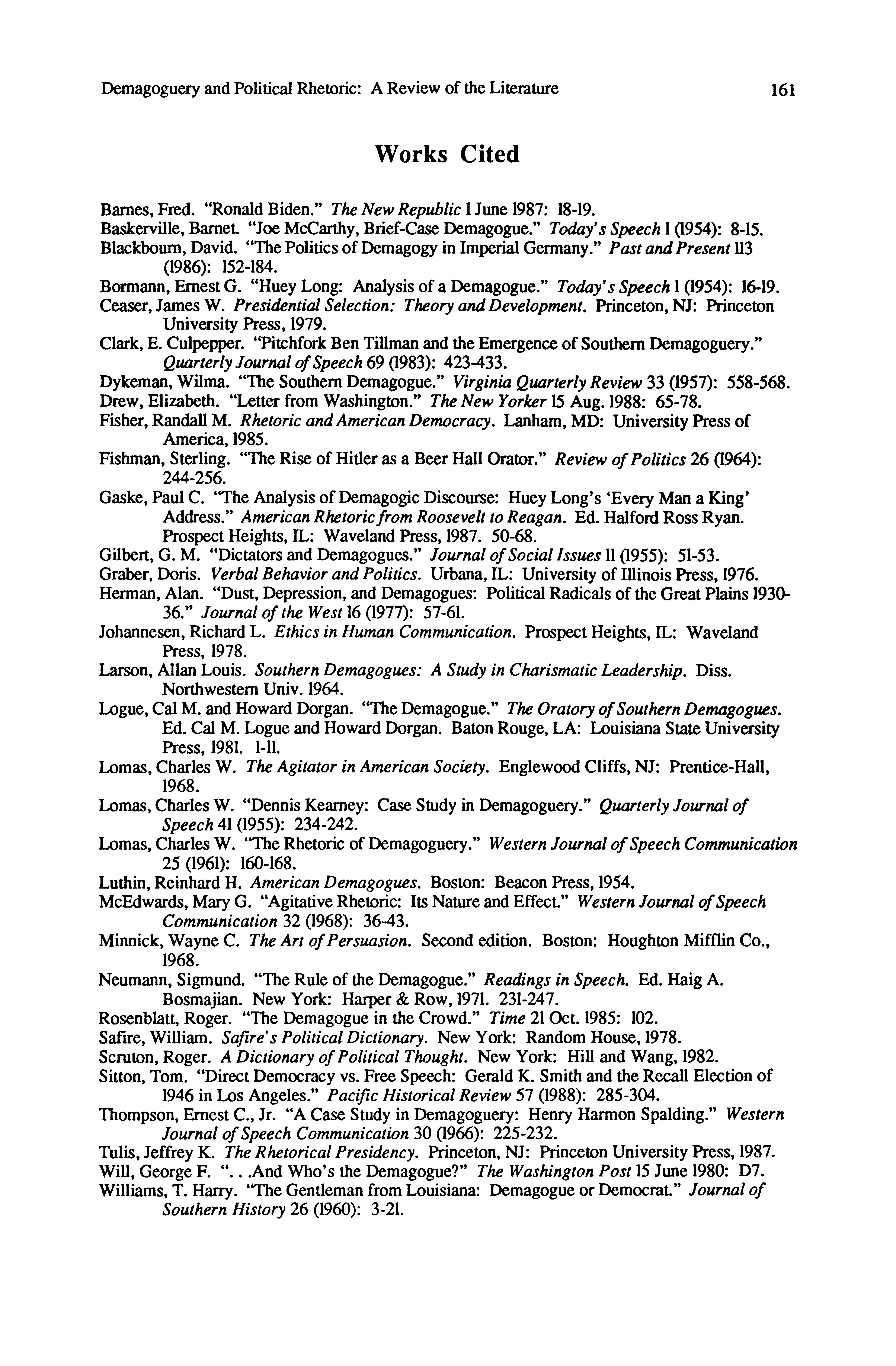DemagogueryandPoliticalRhetoric:A Review of theLiterature,
J.JustinGustainis
InancientGreece,ademagoguewas,literally,a "leaderof thepeople."The meaning of the term has changed considerably since then, however, and a demagoguetodayis regardedassomeonewho "appealsto greed,fear,andhatred" (Safire163),apoliticianwhoachievesorholdspower"bystirringupthefeelingsof hisaudienceandleadingthem[sic]toactiondespitetheconsiderationswhichweigh againstit"(Scruton115).
If "demagogue"is a modem day "devil term,"then its usage will be accompaniedbythedegreeof subjectivitywhichis ahallmarkof suchwordsand phrasesin modernsociety. In short,the label "demagogue"is often used as a weaponby one groupto attackanother(Clark423). This is especially truein Americanpolitics,wherethetermhasbeenusedasan"attackword"asfarbackas 1808(Safire163). Thissubjectivitymayhelptoexplainthewidevarietyof persons whohavebeen,atonetimeoranother,labeledasdemagogues. Somemembersof this less-than-elitegroupareobvious andnoncontroversialcandidates: Senator Joseph McCarthy(Fisher; Luthin;Baskerville), Huey Long (Gaske; Luthin; Bormann;althoughexceptiontothislabelforLongis takenbyWilliams),George Wallace (Johannesen),Adolf Hitler (Blackbourn;Fishman), Louis Farrakhan (Rosenblatt),andsuchwell-knownNineteenthCenturyfiguresasDennisKearney (Lomas, "Dennis Kearney"), "Pitchfork"Ben Tillman (Clark), and William JenningsBryant(Tulis). Otherpublicfigureswhohavebeennominatedforthelist aremoreobscure,including"Ma"and"Pa"Ferguson(Luthin;Herman),GeraldK. Smith (Sitton), andHenryHarmonSpalding(Thompson),while others would seem,atfirstglance,tobeunlikelycandidates:JimmyCarter(Will),JesseJackson (Drew),AndrewJohnson(Tulis),andSenatorJosephBiden(Barnes).
In attempting to understandwhat is nominally called demagoguery, however, two important distinctions should be made. The first involves demagogueryandrhetoric. Althoughdemagoguesuserhetoric(as notedabove), andalthoughdemagogicrhetorichascertainidentifiablecharacteristics(aswill be discussedbelow),itdoesnotnecessarilyfollowthataspeakerwhousesdemagogic rhetoriconaparticularoccasionis thusproperlytobeconsideredademagogue.As Luthinnotes,"thereexistsa bitof demagogueryin themostloftyof statesmen.. ." (355). Thus,ademagoguewouldbecorrectlydefinedasone who habituallyuses thehallmarksof demagoguerytobediscussedlaterinthisreviewof literature.
A second importantdistinctionshouldbe made,this one concerningthe differencebetweenwhatis nominallycalleddemagogueryandnominallycalled agitation.Thedistinctionhasoftenbeenblurredinpractice;formany,allagitators aredemagogues,andviceversa(Lomas,TheAgitator18). Putsimply,anagitator is someonewhoseekstoeffectsocialchangethroughrhetoric.Thetermoftenhas anegativeconnotationbecausethestatusquois usuallyresistanttochangeandthus waryof thosewho urgeit (McEdwards36). Althoughtheagitatormayresortto demagoguery,agitativerhetoricis not,in itself,demagogic(Lomas,TheAgitator 19).
1 Presentedat the annualmeeting of the Speech CommunicationAssociation. San Francisco,California,November 18, 1989.
Theremainderof thisreview discusses the literatureof demagogueryin termsof five areas:situationspromptingdemagoguery,personalcharacteristicsof thedemagogue,the focus on enemies, thedemagogue'sself-proclaimedrole as savior,andtherhetoricalappealstypicalofdemagoguery.
The Demagogue in the Rhetorical Situation
Ithasbeencontendedthatsomeaudiencesandcontextsaremorelikely to encouragethedevelopmentof demagoguerythanareothers.InthesouthernUnited States, for example, demagogues have tended to flourish in the ruralareas. Following the Civil War, the gradualbreakdownof the South's agricultural economyledmanyfarmerstofeel victimized,bothbytheNorthandby theirown leaders.Thissituationhelpedgiverisetothephenomenonknownasthe"Southern demagogue"(Dykeman562). Theruralnatureof the South,combinedwith the effectsof Reconstruction,producedlargenumbersof Southernerswhofeltnoreal connection with their own state's political leaders (Larson 342-343). This alienationwasexacerbatedbytheSouth'seconomicproblems.As Gaskenotes,"at theroot,perhaps,of audienceresponsetothedemagogueis economicdislocation" (60). The demagoguesof the Southwere able to capitalizeon this, andwere providedadditionalammunitionbytheever-presentracialtensionsintheregion. In Dykeman's words, "it was on the subject of the Negro that the Southern demagoguereachedhiscrescendos"(561).
Demagoguerywas not,of course,limitedto theAmericanSouth. Inthis country,for example, it flourishedin the GreatPlains duringthe Depression (Herman57), andthewholenationseemedtobefertilegroundforMcCarthyinthe earlyFifties. Itshouldbeno surprisethatdemagogueryhasbeenseen,fromtime totime,intheUnitedStates,becausedemocraticgovernmentseemstobeoneof the prerequisitieswithoutwhichdemagoguerycannotoperate.A demagoguecanonly succeed in an atmosphereof free speech and free expression, since, as noted earlier,demagogueryis intimatelyboundupwithrhetoric.EvenGermanywas a democraticstateduringtheriseofHitler;itwasonlyafterthisNazidemagoguehad achievedpowerthatthecountrysuccumbedto totalitarianism(Gaske59). Inthe TwentiethCentury,especially,thedemagoguehasonly beensuccessfulwhenhe hada foundationof democracyuponwhichto build,anda democraticplatform fromwhichtospeak(Neumann236).
The Demagogue As a Person
Theworkof thosewhohavestudiedwhatis nominallycalleddemagoguery leadsto the conclusionthata demagogueis a personwho possess at least three characteristics:he is motivatedby self-interest,he evinces littleconcernfor the truth,andheis anopportunist.Eachof thesewill bediscussedbelow.
A numberof scholars have concluded that the demagogue's primary concernis the developmentof his own power,influence, andpopularacclaim. Gilbert defines the demagogue as one "who seeks notoriety and power by exploitingthefearsanddesiresof thepeople.. ."(51),whileJohannesenconcludes thatthedemagogue's"primarymotiveis selfishinterestandpersonalgain"(76). In theirstudy of America'sSoutherndemagogues,Logue andDorganfound that many of the promises made by such men were meaningless or unkeepable, designed primarilyto increasethe demagogue'spersonalstandingamong their followers(10).

Manystudiesconcludethatthedemagogueis aliar,or,atleast,thathefinds questions of truthto be irrelevant. AlthoughThompsonmaintainsthat "most demagoguesareprobablysincereinthesensethattheyarenotconsciouslylying," (228-229), his viewpoint is in the minority. Graberfound that,in demagogic rhetoric,"thereis little concernfor fairnessor truth"(183),and this opinion is sharedby Gilbert(51). Baskervillearguedthatdemagoguesarecharacterizedby "theuseof untruthsanddistortions,"(9), althoughhewasfocusingspecificallyon the rhetoricof Joseph McCarthy. Lomas suggested several reasons why the demagogueandtrutharenoddingacquaintances,atbest,if nottotalstrangers:the demagoguemaybe soignorantastobeunabletodistinguishtruthfromfalsehood; his own prejudicesmay preventhim fromseeking the truth;or he may employ deliberatedeception because it allows him to achieve his goals ("Rhetoricof Demagoguery"161).
Demagogues have also been called opportunistic. That is, ratherthan possessing fixed convictions, they may choose to standfor whatever issue is burninghottestin theheartsof thepeople. LogueandDorgansay thatSouthern demagogues "often acted opportunistically"(10), while Grabercharacterizes demagogicrhetoricbyclaimingthat"appealsareentirelyopportunistic"(183).The demagogue'swillingnessto latchon to thepopularissue of thedayhasalso been attestedtobyJohannesen(76).
The Demagogue and His Enemies
The nominal demagogue cannot function in an atmosphere of social harmonyandtolerance. Historically,demagogueshave only been successful in periodsof turmoil,division,andanxiety. Thisis wellputbyCeaser,whosaysthat "demagoguery... is characterizedby theunitingof a constituencyby meansof opposingit to somethingelse, be it an objectwithinthe communityor another communityaltogether"(57). Itis conceivablethatthe"enemy"denouncedbythe demagoguecouldbe solelyhisowninvention,buthistoryshowsthatdemagogues usuallyexploitexistinghatredsandfears. As was notedabove,demagoguestend to be opportunists. Such opportunitiesare not, unfortunately,rare. In the AmericanSouth, for example, "hatredandresentment[were] concentratedon certainpersonswho [were]denouncedasconspiratorsorrejectedas unwholesome influencesforthesociety"(Larson345), whichallowedSoutherndemagoguesto flourish. InGermanyduringthe1920s,HitlerandotherNazioratorsfixatedonthe popularbeliefinahigh-levelconspiracywhichhadbeenresponsibleforGermany's defeat,andthisgavethemafootholdonthepublicmind(Blackbourn152). Senator JosephMcCarthywas,of course,abletocapitalizeonthewidespreadanxietyabout adomesticCommunistconspiracywhichgrippedAmericain the1950s(Baskerville 8). Thedemagoguemaywellfeel theemotionsheexploitsinhis audience,butthe feelings are also a tool: "Hateis arousedso thatit will obscure thoughtand facilitateuncriticalaction"(Minnick6).
One areaof public concernespecially vulnerableto exploitationby the demagogueis racialandclass hatred. Since thosenearthebottomof the socioeconomic ladder are among the most susceptible to demagogic oratory, the demagogue will attack the rich, the powerful, and the "interests"who take advantageof the poor anddowntrodden(Luthin307). Hitlerrailed againstthe bankersandindustrialistsof WeimarGermany,andas is tragicallywell known, took advantageof widespreadanti-Semitismto focus hatredon theJews. Inthe AmericanSouth,thepoorwhitesof theruralareaswereresentfulbothof theNorth andof manymainstreamSouthernpoliticians(Larson345-346). Further,therace
issuewas alwaysavailableforexploitation,andtheSoutherndemagoguesusedit relentlessly(Dykeman566).
Whiledenouncingthosewhoweredissimilartohis audience(byvirtueof social status,wealth,race, or religion), the demagoguecould also increase the identificationhis audiencefelt withhimby portrayinghimselfas a "manof the people."Manydemagogues"retainedpopularsupportbyappearingtobeordinary, down-to-earthcitizenslike thosewhosevotes theycourted"(Luthin306). Inhis oratory,the demagogue will continually remind the audience of his humble beginnings,so similartotheirown,andwill speakin suchawayastoshowthathe has not lost touch with his origins (Neumann237). In the American South, demagoguesoftenadopted"folksy"nicknameslike "PitchforkBen,""CottonEd," "Pappy-Pass-the-Biscuits,""TheWild ManfromSugarCreek,"and,of course, "TheKingfish"(Dykeman561).
Thedemagoguealsoattemptstoincreasehisaudience'sidentificationwith himby embracing(publicly,atleast)all thevirtueswhichtheaudiencemembers hold dear. He will espouse conventionalreligiousbeliefs; he will proclaimhis partriotism;andhe willemploywhatever"godterms"hethinkswill appeal. Huey Long,forexample,usedto tellLouisianansthathiseconomicprogramshadbeen endorsedbyWilliamShakespeare,DanielWebster,thePope,andAbrahamLincoln (Fisher110).Elsewherein theSouth,demagoguesstoodfoursquarein defenseof God,country,and,especially,Southernwomanhood(Dykeman560).
The Demagogue as Savior
Inordertogainbroadpopularsupport,thenominaldemagoguewill attempt tocreateacrisismentalityin hisaudience. Thisis notquitethesamethingas the demagogue'stakingadvantageof people'shatredsandfears (as was discussed earlier).Thedifferenceis oneof degree;peoplemayexperiencehatredandfearon adailybasisandlearntolive withit,butacrisisrequiresaction. As Fisherputit, "Dissonancecreatesdiscomfort;crisis cancreatepanic,behaviornot ordinarily consideredrational"(108).Itis thisirrationalbehaviorthatthedemagoguewill try to encourageandchannel. Hitlerdidthisin WeimarGermany. He hadlearned howto "paintvividlythehorrors"of impendingdoomandtopersuadehisaudience thatonlythemostdrasticactioncouldfendoffdestruction(Fishman250).
The"drasticaction"whichthedemagoguetalksaboutusuallyinvolvesthe audiencegiving him politicalpower.Once he has thatpower,he promises,the enemywill bedestroyedandtheaudiencewill beredeemed.Thedemagoguethus proposeshimselfas theaudience'ssavior. Oncetheaudienceis convincedof the existenceof crisis,thedemagoguepromisestorestoreorder(Neumann233-234). Gaske argues that demagogic rhetoric conforms to the guilt-victimizationredemption-salvationpatterndeveloped by KennethBurke. The salvation is provided(atleastrhetorically)bythedemagoguehimself(Gaske61-68).
Rhetorical Techniques of Demagoguery
Theliteratureondemagogueryshowsthatthenominaldemagoguetypically employs any of seven rhetoricaltechniques: reliance on personalizedappeal, oversimplification,emphasisonemotionalappeals,useof speciousargument,"ad hominen"attacks, anti-intellectualism,and political pagentry. Each will be discussedbelow.
Personalized appeal. Aristotle divided the artistic (i.e., rhetorcontrolled) forms of proof into ethos,pathos, andlogos: personal appeal,
emotionalappeal,andlogicalappeal.Thedemagogueputsconsiderableemphasis on the first of these. As Larson wrote in his study of American Southern demagogues,"Theauthorityof themenwaspersonalratherthantraditional... the demagogueswereabletocultivatepoliticalloyaltythroughpersonalidentification" (340-341). Gaskepointsout thatone of thedistinctionsbetweenthe mainstream politicalfigureandthe demagogueis that,while the mainstreampoliticianmay representorleadamovement,thedemagogueis themovement(58). Demagogues come to embody the causes for which they fight, and much of theirappealto audiencesis basedonpersonalfactors.
Oversimplification. Simplicityis a hallmarkof muchpoliticalrhetoric. Thisis anunderstandableapproach,sincemostmembersof themassaudienceare neithersophisticatednorwell-educated.Butthedemagoguetakesthisprudentidea one stepfurther- he oversimplifiesthe solutionsto complex problems(Fisher 109-110).Thishasthedoubleadvantageof makingthedemagogue'soversimplified solution understandableto the mass audience, and making that solution seem preferable to the more complex, realistic solutions offered by mainstream politicians. JosephMcCarthymaintainedthatall of America'sproblems,bothat homeandabroad,couldbe blamedon "Communistsubversion"(Baskerville10). Inthe1870's,DennisKearneyblamedallthedifficultiesexperiencedbyCalifornia laborersontheimportationof largenumbersof Chinese(Lomas,"DennisKearney" 163). HueyLongclaimedthatallthenation'seconomicproblemscouldbe solved bythesimpleplanof "sharethewealth"(Fisher109-110).
Emotional appeals. Justas mostpoliticiansregardsimplicityin rhetoric as a virtue,so too wouldmost of themadmitto appealingto theirconstituents' emotions,atleastoccasionally. Thedifferencebetweenthemainstreampolitician andthedemagogueis thatthelatteremphasizesemotionalappealtotheexclusionof rationalthought(Lomas"Rhetoricof Demagoguery"165). This is whatmany peoplethinkof whentheyheartheword"demagogue":arhetoricalfire-breather who can turnan audienceof supposedlyrationalpeople into a mob of howling madmen. Thisconceptionis slightly hyperbolic,butit essentially characterizes whatdemagoguestryto do (Larson346). Thedemagoguethusfocuses muchof hisrhetoricatthe"non-thinkingsideof humannature"(Minnick6), becauseif the audiencepausedtothink,itmightthinktwiceaboutthedemagogue.
Specious argumentation. Thedemagoguedoes notignorethecognitive aspectof rhetoricentirely. Butwhenhe doesemploywhatclassicalrhetoriccalls logos, hisargumentis oftendeliberatelydistorted.Thiscanbetruewithrespectto either reasoning, or evidence, or both. As Minnick notes, "although the demagoguedoes notliketo reasonatall, he will attimesoffer a kindof pseudoreasoningwhich often deceives the intelligence insteadof enlighteningit" (6). "Pseudo-reasoning"refers to argumentswhich, while sounding good to the untutoredlistener,areinfactlogicallyfallacious.
Thedemagogueis alsocarelesswithevidence, citing"proof' whichis in fact proofof nothingat all. The textbookexampleof this approachis Senator Joseph McCarthy,who was much given to the waving of "lists" which were purportedto contain the names of Communists in the State Department,or elsewhere. Thelists wereneverproducedforinspection;theevidencewas never provided. As Lomaspointsout,"Thecitationof 'facts' is no guaranteeof either theiraccuracyortheirinterpretation"("TheRhetoricof Demagoguery"164).
Ad hominem attacks. Theargumentumad hominemis a recognized logical fallacy. As such, it could have been discussed above under"specious argumentation,"butit is socharacteristicof demagoguerythatitdeservesseparate mentionhere. Argumentumad hominem(literally"argumentagainstthe man") involvesignoringtheargumentsmadebyanopponentandattackingtheopponent's characterinstead. ThiswasfrequentlyemployedbyAmerica'sdemagoguesof the
South. Forthem,"thefunctionof name-callingwasmainlytocreateaclimateof emotionalexcitementandpersonalinvolvementon thepartof thevoters"(Larson 347). Indeed,therhetoricof suchmenoftendemonstrated"publiccontemptof social,economic,andpoliticalconventions"(LogueandDorgan9). InCalifornia, DennisKearneyinsultedhisopponentswithsuchvenomandimaginationthat,had duellingbeenstillinpractice,hewouldhavebeenchallengedadozentimes(Clark 427).
Anti-intellectualism. Gilbert(51)believes that anti-intellectualismis basicto demagoguery. Itis notdifficultto see why thismightbe so. Since, as noted above, demagogues attemptto set the lower classes against the upper, intellectualsarea naturaltarget,since theyareusuallyidentifiedwith theupper classes(ineducationif notinwealth). Further,theintellectualis thedemagogue's foremostenemy,sincetheformeris oftenadeptatpointingoutthefallaciouslogic andoversimplificationsof thelatter. Thisis one reasonwhy demagogueshave frequentlyattackednewspapers;theywererespondingtothenewspapers'exposes of thedemagogues'speciousrhetoric(Luthin309-310).Intellectualsoftenpresent aneasy targetfor the demagogue. Recognizingthatcomplex problemsrequire complexsolutions(ormayevenhaveno solution),theintellectualrarelycanoffer simple, easily-graspedideas to the public. The demagogue,with his flair for flippantanswersandsimplesolutions,can sometimesmaketheintellectuallook pompousorsilly(Baskerville10-11).
Political pagentry. As has been mentioned throughoutthis review, demagoguestendnottobeinterestedinseriousdiscussionof issues. Instead,they areinclinedto offer personalappealsandemotion. These areoftenprovidedat massmeetings,whicharean attemptto takean advantageof crowdpsychology (Neumann239). Such meetings often containotherelements associated with pagentry: songs, marches,torchlight,repetitive slogans, bands, and banners (Fisher111).The rallies at which demagoguesspoke were often reminiscentof "carnivals"(Larson),"Barnumism,"and "showmanship"(Luthin303). They providedentertainmenttoattractlistenersandsimultaneouslytopreventthemfrom thinkingtoomuch.
ThephenomenoncalledDemagogueryhasnotpassedfromthescene,either inAmericaoraroundtheworld. Itcanonlybecombattedif itis understood.Itis hoped that this review of literature will make some contribution to that understandingandwill serveas a startingpointto scholarswho wish furtherto exploretherhetoricof demagoguery.
J.JustinGustainis Departmentof Communication StateUniversityof
NewYork,Plattsburgh
Works Cited
Barnes,Fred. "RonaldBiden." TheNewRepublic1June1987: 18-19.
Baskerville,Barnet."JoeMcCarthy,Brief-CaseDemagogue."Today'sSpeech1(1954): 8-15. Blackbourn,David. "ThePoliticsof DemagogyinImperialGermany."Past andPresent113 (1986): 152-184.
Bormann,ErnestG. "HueyLong: Analysisof a Demagogue." Today'sSpeech1(1954): 1&19. Ceaser,JamesW. PresidentialSelection: TheoryandDevelopment.Princeton,NJ: Princeton UniversityPress,1979.
Clark,E.Culpepper."PitchforkBenTillmanandtheEmergenceof SouthernDemagoguery." QuarterlyJournalofSpeech69 (1983):423-433. Dykeman,Wilma. "TheSouthernDemagogue." VirginiaQuarterlyReview33 (1957): 558-568. Drew,Elizabeth. "LetterfromWashington."TheNew Yorker15Aug.1988: 65-78. Fisher,RandallM. RhetoricandAmericanDemocracy. Lanham,MD: UniversityPressof America,1985.
Fishman,Sterling. "TheRise of Hitleras a BeerHallOrator."Reviewof Politics 26(1964): 244-256.
Gaske,PaulC. "TheAnalysisof DemagogicDiscourse: HueyLong's 'EveryManaKing' Address."AmericanRhetoricfromRoosevelttoReagan. Ed.HalfordRossRyan. ProspectHeights,IL: WavelandPress,1987. 50-68.
Gilbert,G. M. "DictatorsandDemagogues."JournalofSocialIssues 11(1955): 51-53.
Graber,Doris. VerbalBehaviorandPolitics. Urbana,IL: Universityof IllinoisPress,1976. Herman,Alan. "Dust,Depression,andDemagogues:PoliticalRadicalsof theGreatPlains193036."Journalof theWest16(1977): 57-61.
Johannesen,RichardL. EthicsinHumanCommunication.ProspectHeights,IL: Waveland Press, 1978.
Larson,AllanLouis. SouthernDemagogues: A Studyin CharismaticLeadership. Diss. NorthwesternUniv. 1964.
Logue,CalM.andHowardDorgan. "TheDemagogue."TheOratoryofSouthernDemagogues. Ed.CalM.LogueandHowardDorgan. BatonRouge,LA: LouisianaStateUniversity Press, 1981. 1-11.
Lomas,CharlesW. TheAgitatorinAmericanSociety. EnglewoodCliffs, NJ: Prentice-Hall, 1968.
Lomas,CharlesW. "DennisKearney:CaseStudyinDemagoguery."QuarterlyJournalof Speech41(1955): 234-242.
Lomas,CharlesW. "TheRhetoricof Demagoguery."WesternJournalof SpeechCommunication 25 (1961):160-168.
Luthin,ReinhardH. AmericanDemagogues. Boston: BeaconPress,1954. McEdwards,MaryG. "AgitativeRhetoric:ItsNatureandEffect." WesternJournalofSpeech Communication32 (1968): 36-43. Minnick,WayneC. TheArtofPersuasion. Secondedition. Boston: HoughtonMifflinCo., 1968.
Neumann,Sigmund. "TheRuleof theDemagogue."Readingsin Speech. Ed.HaigA. Bosmajian. New York: Harper&Row, 1971.231-247. Rosenblatt,Roger. "TheDemagoguein theCrowd." Time21Oct. 1985: 102. Safire,William. Safire'sPoliticalDictionary. New York: RandomHouse,1978. Scruton,Roger. ADictionaryof Political Thought.New York: Hill andWang,1982. Sitton,Tom. "DirectDemocracyvs. FreeSpeech: GeraldK. SmithandtheRecallElectionof 1946inLos Angeles." Pacific HistoricalReview57 (1988):285-304. Thompson,ErnestC.,Jr. "ACaseStudyin Demagoguery:HenryHarmonSpalding." Western Journalof SpeechCommunication30 (1966): 225-232. Tulis,JeffreyK. TheRhetoricalPresidency. Princeton,NJ: PrincetonUniversityPress,1987. Will, GeorgeF. ". . AndWho's theDemagogue?" TheWashingtonPost 15June1980: D7. Williams,T. Harry."TheGentlemanfromLouisiana:DemagogueorDemocrat."Journalof SouthernHistory26 (1960): 3-21.

